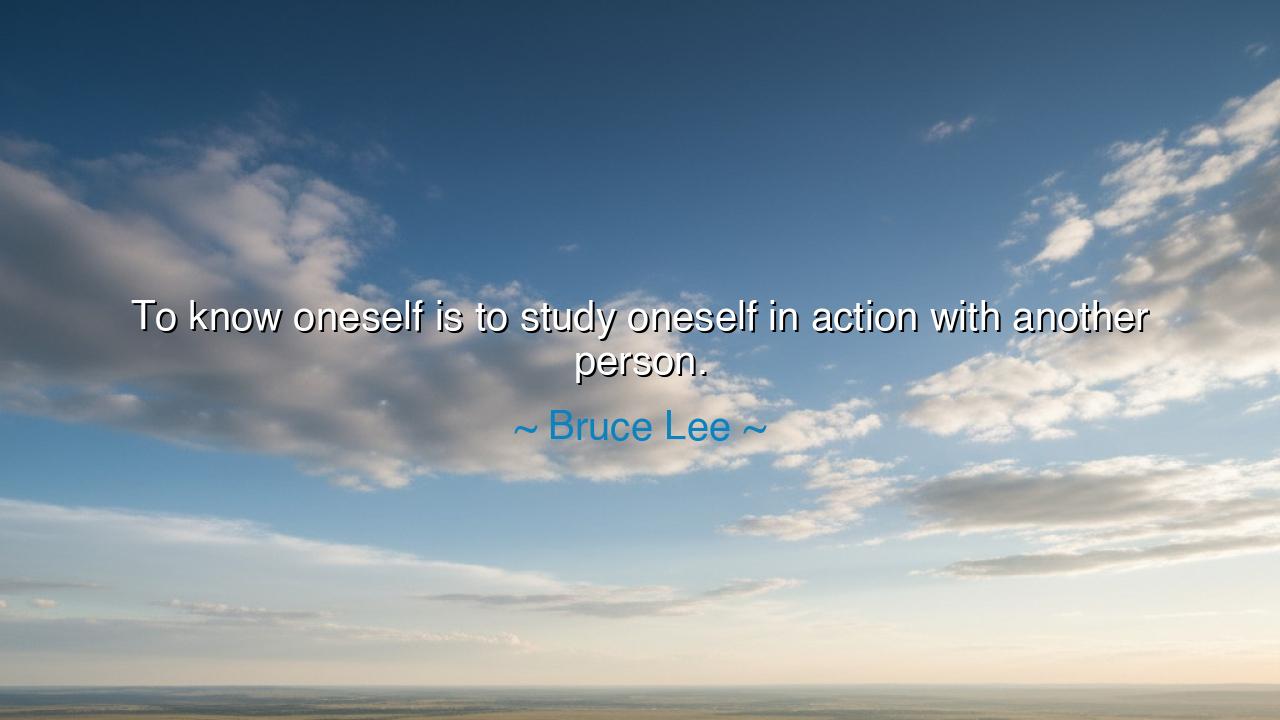
To know oneself is to study oneself in action with another






“To know oneself is to study oneself in action with another person.” — Thus spoke Bruce Lee, master not only of martial arts but of life itself. His words cut through illusion like a blade through water. They remind us that self-knowledge is not born in solitude alone, nor in the safety of thought, but in the living moment — in our interactions, our conflicts, our compassion, and our truth revealed through others. To know the self, one must first step into the arena of human relationship, for it is there that the masks fall away, and the soul is tested in the fires of connection.
In these words, Bruce Lee unveils a paradox known to the wise since ancient times: that we cannot see ourselves clearly without a mirror, and that other people are that mirror. Alone, a man may imagine himself patient, humble, or brave. But it is only when he faces another — when his patience is tried, his pride is wounded, his courage is called upon — that his true nature is revealed. Self-knowledge does not come from theory, but from experience, from the living dance of emotion and reaction. It is in the presence of others that we discover the edges of our strength and the shadows of our weakness.
This insight was born from Bruce Lee’s own path — the path of the martial artist, the philosopher, and the seeker. In combat, he saw that every encounter was not merely a contest of strength or skill, but a dialogue between souls. When facing an opponent, he was not fighting the other man alone — he was facing himself: his fear, his ego, his hesitation, his flow. The opponent became his teacher, and the moment of action became a mirror of the mind. Through every punch, every block, every movement, he learned who he truly was — not as he imagined himself to be, but as he acted when confronted with challenge. Thus, the art of fighting became the art of self-understanding.
This truth is not confined to the world of martial arts. In every realm of life, we reveal ourselves through relationship. The friend who disappoints us, the rival who provokes us, the lover who challenges us to open our hearts — each is a sacred teacher, drawing forth aspects of our being that lie hidden in silence. In anger, we learn the shape of our pride; in forgiveness, the depth of our compassion. In conflict, we discover whether we are guided by fear or by principle. Through every interaction, we are offered the chance to see ourselves not as we wish to be, but as we are — and to grow from that revelation. To study oneself in action with another is to practice living consciously, turning every encounter into a lesson.
Consider the ancient philosopher Socrates, who wandered the streets of Athens questioning all who would speak with him. He believed that wisdom was not taught in solitude but born through dialogue — through the friction of ideas, the clash of minds, the unveiling of ignorance and truth. Like Bruce Lee, he knew that self-knowledge comes through interaction, through testing the boundaries of one’s own understanding against the reality of another. Both men, though worlds apart, shared the same insight: that to know oneself, one must engage fully with life and with people — for life, like combat or conversation, reveals what contemplation alone cannot.
There is also humility in this teaching. To know oneself through others is to recognize that we are not isolated beings, but reflections in a vast and living tapestry. Each person we meet is both a challenge and a gift. Some bring us joy, others pain; but all, if we are wise, bring us closer to understanding ourselves. Even the one who angers us most may be our greatest teacher, for they awaken in us the parts we have not yet mastered. The wise do not flee from such mirrors; they gaze into them bravely, and through them, they evolve.
So, my child, if you would truly know yourself, do not retreat from the world — step into it. Engage with others, not to judge them, but to learn about yourself. Observe your reactions — your words, your silences, your impulses. Ask, “Why did I feel this? Why did I speak that way?” Let every encounter, whether pleasant or painful, become a page in the sacred book of your own understanding. The more you study yourself in relation to others, the more conscious, compassionate, and free you become.
For in the end, as Bruce Lee taught, self-knowledge is not found in still waters, but in the flow of life. The mirror of solitude shows only the surface; the mirror of relationship shows the soul. When you can see yourself clearly amid the chaos of action — when you remain true to your essence even as you engage with others — then you will have discovered the greatest mastery of all: mastery not over others, but over yourself. And in that mastery lies peace, power, and wisdom beyond measure.






AAdministratorAdministrator
Welcome, honored guests. Please leave a comment, we will respond soon